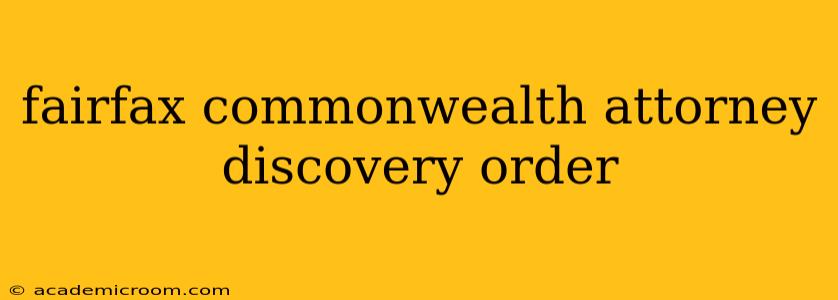The Fairfax Commonwealth Attorney's office, like all prosecuting offices, operates under a specific set of rules and procedures regarding the discovery process. Understanding these procedures is crucial for both the prosecution and the defense in ensuring a fair and just legal process. This guide provides a comprehensive overview of the discovery order process in Fairfax, Virginia. While specific details can vary depending on the individual case and the judge's discretion, this information offers a general understanding of what to expect.
What is a Discovery Order?
A discovery order, in the context of a criminal case, is a court order that outlines the specific information and evidence that each side must provide to the other before trial. This exchange of information ensures transparency, allows both sides to prepare their case effectively, and helps to promote a fair trial. The Commonwealth Attorney's office, representing the prosecution, is obligated to disclose certain materials to the defense, and vice-versa.
What Information Does the Fairfax Commonwealth Attorney Typically Disclose?
The Fairfax Commonwealth Attorney is generally required to disclose evidence that is favorable to the defendant, whether it tends to negate guilt or mitigate punishment. This often includes, but is not limited to:
- Witness information: Names, addresses, and statements of witnesses the Commonwealth intends to call at trial.
- Police reports: Detailed accounts of the investigation, including witness interviews, crime scene analysis, and evidence collected.
- Forensic reports: Results of any forensic testing, such as DNA analysis, toxicology reports, or fingerprint analysis.
- Physical evidence: Information regarding any physical evidence collected, such as weapons, drugs, or clothing.
- Expert witness reports: Summaries of expert testimony and their conclusions.
- Exculpatory evidence: Any evidence that tends to show the defendant's innocence.
It's crucial to understand that the specific materials disclosed are subject to the rules of evidence and the judge's discretion.
What if the Commonwealth Attorney Fails to Disclose Evidence?
Failure to comply with a discovery order can have significant consequences. The judge may impose sanctions, which could include:
- Exclusion of evidence: The judge may prevent the Commonwealth from using the undisclosed evidence at trial.
- Dismissal of charges: In some cases, particularly if the withheld evidence is significantly exculpatory, the judge may dismiss the charges entirely.
- Other sanctions: The judge might impose other sanctions, such as fines or other penalties.
It is vital for defense attorneys to diligently review all discovery materials and promptly raise any issues of non-compliance with the court.
How Does the Discovery Process Work in Fairfax?
The discovery process usually unfolds in stages, often beginning soon after the arraignment. The specific timeline depends on the complexity of the case and the court's schedule. It generally involves:
- Initial disclosure: The Commonwealth Attorney provides an initial set of discovery materials to the defense.
- Requests for further discovery: The defense attorney can request additional information or clarification on specific aspects of the case.
- Responses to discovery requests: The Commonwealth Attorney responds to the defense's requests, providing the requested information or explaining why the information is not subject to discovery.
- Motion to compel discovery: If the Commonwealth Attorney fails to provide requested information, the defense can file a motion to compel discovery, asking the court to order the Commonwealth to comply.
What are the Common Challenges Faced During the Discovery Process?
- Time constraints: The process can be time-consuming, particularly in complex cases.
- Volume of materials: The amount of information exchanged can be substantial.
- Disputes over relevance and admissibility: There can be disagreements over what information is relevant to the case and admissible as evidence.
- Understanding complex scientific evidence: Interpreting forensic reports and other complex scientific evidence can be challenging.
This information is for educational purposes only and does not constitute legal advice. Anyone facing criminal charges in Fairfax County should seek the advice of a qualified attorney.
H3. How long does the discovery process typically take in Fairfax?
The timeframe for the discovery process varies greatly depending on the complexity of the case, the volume of evidence, and the court’s schedule. Simple cases might see discovery completed within a few months, while complex cases could extend for a year or more. Diligent work by both the prosecution and the defense is essential for an efficient process.
H3. What if I believe the Commonwealth Attorney is withholding evidence?
If you believe the Commonwealth Attorney is withholding evidence, it is crucial to consult with your attorney immediately. They can file motions to compel discovery, argue for sanctions, and take other legal steps to ensure you receive all relevant information. Your attorney's experience in navigating the complexities of the Fairfax court system is invaluable in such situations.
H3. Are there specific deadlines associated with discovery in Fairfax?
Yes, there are often specific deadlines set by the court for the completion of discovery. These deadlines are established based on the case's specific circumstances and are outlined in court orders. It's vital to be aware of these deadlines and to ensure all necessary steps are taken within the allocated timeframe. Failure to meet these deadlines can have negative consequences.
This overview provides a general understanding of the Fairfax Commonwealth Attorney's discovery order process. Always consult with legal counsel for advice specific to your situation.
